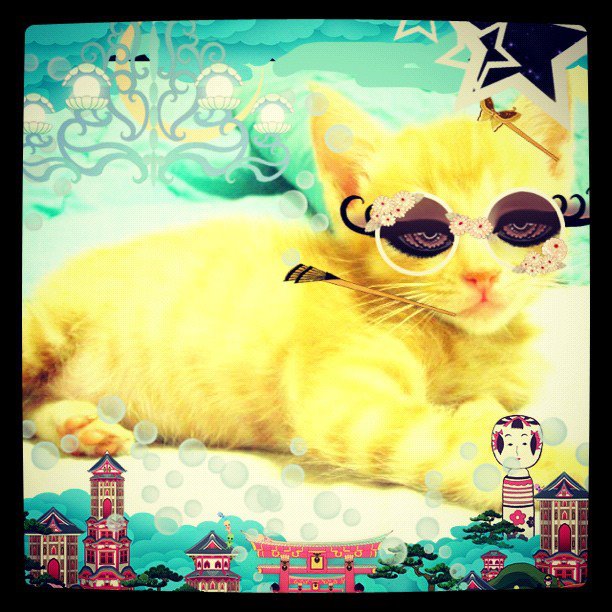Turning my iPod up as loud as I can stand, I’m ignoring everyone else in the staffroom. Realizing that both of my coworkers are staring at me with wide eyes and raised eyebrows, I start in surprise.
“Sabrina,” Kyung-Ha says, “is there a cat?”
Looking from my co-teachers to the cardboard box under Shauna’s desk and back again, I realize that the jig is up.
* * *
“No, Sabrina,” my mom says on the phone. “Don’t do this to me. No. No. No.”
Watching me make my overseas phone call, Shauna’s eyes are round and worried. Not wanting to be involved, Maria and Clare have gone home early. It’s just Shauna, Asia, Emile and me shifting and pacing in a loose huddle. Strangers are barely looking at us as they run up and down the stairs, going in and out of the batting cages.
Just under the steps, someone has laid out a newspaper. There’s a carton of milk and a spoon with just a dribble in it. Not paying the least bit of attention to the spoon or the milk is a tiny orange kitten, no bigger than a ball of yarn, meowing as loud as it can. With distorted K-pop music blaring at each carnival ride, glaring lights flashing and cheap fireworks going off the side of the pier, most people find it easy to ignore.
Before leaving Canada, I promised my mom I wouldn’t acquire any pets. She already has two cats and a dog and she heard a story about a girl who spent hundreds of dollars bringing a dog home from China. Under no circumstances am I to bring this cat home.
“Mom, it’s so small,” I say. “And I’m not bringing it home to you. Shauna’s bringing it home to her mom.”
My mom once nurtured a kitten back from near-death when the mother abandoned it, so I’m sure she can recommend a strategy for saving this one. She says that if we absolutely can’t find the mother, we should check out a pet store and find something called “kitten milk” and feed it slowly with an eye-dropper.
A girl working at the 7-11 generously donates an empty box to our cause and we find a taxi to take us to HomePlus: it’s after nine on a Tuesday and most pet stores are already closed. The kitten mews all through the ride and Emile tries to cover the sound with his own mewing.
Wondering briefly what the taxi driver thinks of foreigners who meow, I remember that my friend Yuri once told me that many Koreans don’t want pet cats because they are considered bad luck. This makes me worry that we won’t be able to find what we want, so I call Chris to see if he can do a Google search on what to feed unweaned kittens. He gives us a short list of ingredients and we head inside.
We quickly learn that HomePlus is not equipped to deal with the rescue of abandoned street cats: there is no kitten milk. Buying the ingredients Chris suggests, Shauna and I wish our friends goodnight and head back to our apartment building. The kitten’s mews are frantic now, but this time neither of us bothers to try and cover the sound for the driver.
It turns out that taking care of a kitten this young isn’t that different from caring for a newborn baby. She needs to be fed every few hours and this presents both the challenge of uninterrupted sleep and going to work. We’ve never explicitly been told we can’t bring pets to school, but it doesn’t seem likely that the kitten, newly named Frankie, will be welcome.
Our office is a narrow room with desks lining the walls. Serving as an irritating obstacle course, a “craft” table and ten chairs fill the rest of the room, forcing seven teachers and the occasional student to navigate with flexibility and gentle pushing. Shauna brings Frankie in a cardboard box and tucks her under her desk without anyone noticing.
For the first part of the day, Shauna manages to time her feedings so that Frankie is asleep while she’s teaching. Once the kindergarteners go home though, she starts teaching her six hour stretch with no real break.
She tries to feed her in the short interval between classes, but it must not be enough because some time after I put my headphones on, Frankie wakes up hungry and probably unimpressed by her cardboard prison. When my coworkers ask if there’s a cat and I hear her mewing, I don’t see how I can deny it.
Kyung-Ha and Helena take turns holding and petting Frankie, who fits comfortably in one hand. When Shauna walks in between classes, she stops, but everyone else coos over the kitten: it’s hard to dislike something so adorable.
For all the problems I have with my hagwon, this is probably the moment when I most appreciate our lack of clear communication. They comment that there is a cat, but no one tells Shauna to take Frankie home. They simply accept Shauna as a working cat-mother, bringing her baby to work when she can’t get a sitter and we simply accept their weirdly progressive views on cat-mother workplace policy.
Art courtesy of Shauna Smith.

